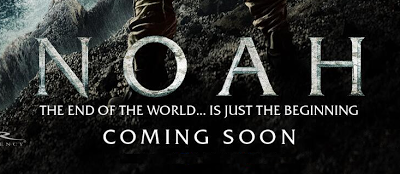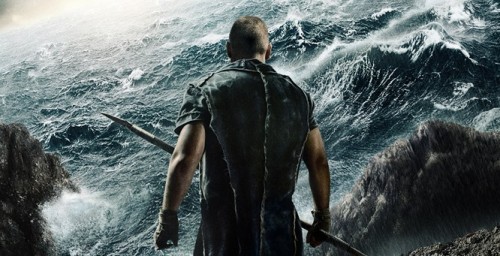On Friday, March 28, Paramount Pictures will release Noah into U.S. theaters after a flood of controversy. Noah, dubbed a biblical blockbuster, was co-written and directed by Darren Aronofsky, the award winning director of Black Swan (2010.) Noah has an all-star cast including Russell Crowe, Anthony Hopkins, Jennifer Connolley and Emma Watson.
http://youtu.be/_OSaJE2rqxU
Almost any time a biblical story is adapted to film, there will be controversy. Does the movie adhere to the original narrative? Does it represent its characters and thematics accurately? Are the creative elements born of the spirit in the original text? These are some of the questions that circle around all biblical films. Realistically these are the same questions that arise with the adaptation of any famous text. However when religion is the story’s birth-mother and caretaker, the questions are far more poignant and the debate more heated.
“Noah’s Ark” is arguably one of the most well-known Old Testament stories and is often used as a children’s tale. It has been re-told in so many formats that it almost transcends its biblical roots becoming a mythical story in our over culture. “Noah’s Ark” has even found its way into the whimsical world of Disney cartoons (Fantasia 2000) and Broadway musicals (Two By Two).
Considering the amount of creative license needed to produce a Broadway or Disney rendition of the story, it may seem surprising that anyone would consider protesting a live-action adaptation by an award-winning director. However that is exactly what has been happening.
To date the film is banned in four Islamic countries (UAE, Indonesia, Bahrain and Qatar) and is expected to be banned in Egypt, Jordan and Kuwait. Their objections are based upon the Islamic rejection of “any acts depicting the messengers and prophets of God.” as reported by Reuters. Paramount expected these bans.

Paramount Films Noah 2014
Back here in the U.S. viewer complaints center mostly on Noah’s characterization as well as its sub-themes. According to The Hollywood Reporter, a group of Christian viewers invited to test market the film “questioned [its] adherence to the Bible story and reacted negatively to the intensity and darkness of the lead character.” One interviewee described Noah as a “crazy, irrational, religious nut who is fixated on modern-day problems like overpopulation and environmental degradation.” In response, Russell Crowe has told an ABC interviewer, “This is a dude who stood by and watched the entire population of the planet perish. He’s not benevolent. He’s not even nice.”
Similar complaints have been pouring in since the movie’s inception. In 2012 Brian Godawa coined the now famous title “Noah: Environmentalist Wacko.” After reading the script, he wrote “This movie will be rejected by millions of devoted Bible readers worldwide because once again it subverts their own sacred narrative with a political agenda of pagan earth religion.” Godawa has also been quoted as saying, “the director had transformed a scriptural story into ‘environmental paganism’ by blaming the great flood on man’s “disrespect” for the environment.”
It is no secret that Hollywood breathes contemporary issues into its adaptations. Was this film project born after an executive finished reading a report on global warming and the potential drowning of populated coastal areas? It is conceivable. The international media has billed Noah as “the original disaster story.” Interestingly enough, a 1928 Warner Brothers version of Noah’s Ark is largely considered the first melodramatic Hollywood disaster movie. There is an undeniable narrative correlation and, realistically, disaster movies are hot box office fodder.
Returning to 2014, Aronofsky’s Noah is just that: Aronofksy’s Noah. As filming progressed, Paramount became increasingly nervous that his creative license would not appeal to its target audience – conservative Christians. They began to test market various cuts of the film at the risk of straining the producer-director relationship. In the end, Paramount has opted to release the director’s cut despite viewer concerns.
According to the Washington Times, Aronofsky calls his film a mythic,“dark parable of sin, justice and mercy.” He also said it is the “least biblical Bible film ever made” calling Noah the “first environmentalist.” However Aronofsky also notes that biblically-based details directly informed the film’s development including the shape of the Ark and Noah’s drinking bout. In a recent ABC interview he said, “You don’t want to mess with it [the story]. You just want to bring it to life and … breathe life into it.”
Although Paramount will be releasing Aronofsky’s version, they are doing so with the following message attached:
The film is inspired by the story of Noah. While artistic license has been taken, we believe that this film is true to the essence, values, and integrity of a story that is a cornerstone of faith for millions of people worldwide. The biblical story of Noah can be found in the book of Genesis.
Paramount’s decision to add this disclaimer was based upon a request from the National Religious Broadcasters, “a non-partisan international association of …Christian communicators coming together to spread the life-changing Truth of the Gospel of Jesus Christ through every electronic medium available.” Having spent a reported $130 million on the biblical blockbuster, Paramount felt the disclaimer was fiscally prudent.
There are many Christian, Muslim and Jewish leaders who have come out in support of the film. Most recently, the Pope himself granted Crowe an audience after three requests. According to several reports, he blessed the film’s release.

Paramount Pictures Noah (2014) Starring: Russell Crowe
Despite Papal approval, viewer objections still haunt the film. Creationist Ken Ham has asked his followers to see Ray Comfort’s Noah film, being released the same day, “instead of wasting money by supporting a pagan Hollywood Noah movie that really makes a mockery of the account of Noah, the Ark and the Flood.”
Once again the primary accusation is one of fostering “paganism” (lowercase intended.) In most cases, the word is simply used to refer to “secularism or environmentalism.” However in many of these reviews, the writers are in fact referring to what they call “pagan earth religions.”
This begs the question: Does the film have Pagan themes? After hearing such complaints, did Paramount ask the opinion of people practicing “Earth Religions?” If so there are no such indications or media reports.
Will you go see the film? Pagan blogger Jonathan Korman is looking forward to its release. He wrote, “I have been joking that Darren Aronofsky’s forthcoming film Noah is a film for which I may be the only audience. I’m ethnically Jewish, a former atheist, and a Modern Pagan, with a fascination with the whole range of religions and myth.”
He may be right in its very eclectic appeal. Compressing the flurry of mainstream articles and reviews, here’s a glimpse at the global scope that has and still is surrounding the film and its production. In the mythic style of Lord of the Rings, Aronofsky’s Noah is a creative retelling of a beloved biblical story written and directed by Jews; containing contemporary Pagan Earth Religion themes; marketed specifically to a conservative Christian audience and banned by the world’s Islamic community.
And they call Hollywood secular.
The Wild Hunt is not responsible for links to external content.
To join a conversation on this post:
Visit our The Wild Hunt subreddit! Point your favorite browser to https://www.reddit.com/r/The_Wild_Hunt_News/, then click “JOIN”. Make sure to click the bell, too, to be notified of new articles posted to our subreddit.

The family reaction here to first seeing a trailer for this film was a unanimous “Oh, Russell…noooooo!” We have no plans of watching it; but this article gives me a bit of schadenfreudish hope: aside from pissing off the Religious Right, maybe it will make clear (if not to them, to others) just how cruelly homicidal a deity they all are worshiping. Me, yes, I am an earth-loving pagan. Dragged aboard said Ark? Seeing my fellow humans and other animals drowning? I’d have jumped….
Maybe I’m missing something here, but why were they trying to market to conservative Christians? And why choose Aranofsky for that? Why not the maniacal Mel Gibson or someone with conservative credentials? It was bound to end in disaster- well, at least as far as their target audience goes.
I’m sure these Christians would be equally offended to learn that the Rabbinic tradition has always been deeply ambivalent about Noah. Starting with the Torah’s statement that Noah was “a righteous man, blameless in his generation,” the Rabbis wondered, given how wicked everyone in his generation was, how righteous could Noah have actually been?
My first thought when I heard about this was whether they’d include the post-flood scene where Noah (who is credited with the invention of viticulture) gets drunk and passes out naked and his son Ham gets cursed with becoming the progenitor of African people for making fun of his tiny penis. I’m guessing they’re going to forgo that even though it’s straight out of the Bible.
What chapter is that in?!
Genesis 9: 20-27
I’m wondering how far they are going with the inclusion of the Watchers, Nephilim etc. From what I’ve read, it seems like there is some of that stuff in there, but probably not too much so as not to offend the poor Biblical literalists (even though the Torah essentially makes a connection between the appearance of the Nephilim and the Flood). It would have been awesome if the movie went full-on Book of Enoch.
The Book of Enoch would make a pretty decent movie.
Actually, that’s where part of the outrage on part of the “xtians” is coming from… Noah gets drunk in celebration and goes full frontal. I also like the “fact” that 8 people had to repopulate the earth, but nobody ever screams about incest (ditto Adam, Eve, Cain & Seth – poor Eve must have been exhausted).
if you read Genesis carefully you’ll see there are two parallel creation stories and human beings are actually made twice, there were a lot of people made in the first one for Adam and Eve (made in the second one) to breed with…
I’m not sure about the Orthodox standpoint, but the Bible says he was a righteous man in his time. In other words, he wasn’t a great man unless you compared him to the other men around him. Apparently, he was surrounded by some not so wonderful people.
Ironic that reviewers accuse the film of having pagan elements. The story had a rich history before it became incorporated in the Abrahaminic texts. It descends directly from the Sumerian Gilgamesh Poems, the Akkadian Atra-Hasis Epic and the Akkadian Gilgamesh Epic. Its proudly pagan creds go waay back. Here’s to Utnapishtim!
And the Navajo peoples also have a deluge creation myth (although that was only 1 of 4 disasters) … we’re on the fifth world right now.
I’m a sucker for blockbuster disaster-type movies, and this one looks like a great one to sit back and enjoy. To me, it’s just a big-budget retelling of an age-old myth–no different than “Hercules” or “Clash of the Titans”. I’m looking forward to seeing it!
The trailers I’ve seen leave me wondering what Gandalf might have done if he were a character in the movie “2012”.
There’s storytelling, Storytelling and STORYTELLING!!! I put “Noah” somewhere between the second and third categories, and since I have no intention to see it, there it will remain.
My first thought on hearing the cast for this movie was “Why not get some people from the right area to play the roles?”
I’m pretty sick and tired of all the white middle eastern characters.
Then I saw some pictures and footage and realised the skin colour is about as authentic as it gets…